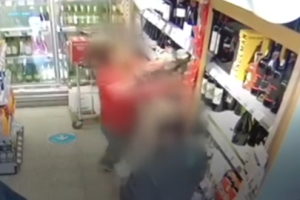The actions of Extinction Rebellion (XR) were condemned by the Federation of Independent Retailers (NFRN), prime minister Boris Johnson and home secretary Priti Patel.
Protestors blocked access to printing presses owned by News UK in Hertfordshire and Merseyside on Friday evening and delayed distribution of the Saturday editions of several newspapers. There was also a protest the same night at the Eurocentral printing plant near Motherwell, Scotland, which was described as “peaceful with no issues”.
Ralph Patel, who runs a newsagent in Woodmansterne, Surrey, said: “It is not right that these people have the power to disrupt everybody’s business and not think twice about it. It is not just retailers’ business, it is the jobs of paper boys and girls which is damaged by this sort of action. Lives have been disrupted and that can’t be right. It is a lose-lose situation for everybody concerned.
“The only saving grace for retailers is that it was a Saturday and so the delivery boys and girls did not have to go to school so some were available to make deliveries when the papers finally arrived.”
Patel, a former national president of the NFRN, did not receive his copies of The Sun, The Times and The Telegraph until 9.30 on Saturday morning and was forced to deliver many himself. “I was fortunate because it could have been a lot worse. Many retailers did not receive their copies until later on Saturday morning and they had to deliver copies because you can’t have delivery people waiting around indefinitely.”
Retailer Harry Goraya did not receive any copies of The Times, The Sun or The Telegraph on Saturday. “Some were delivered on Sunday but by that time they were not wanted by my customers. My losses were minimal – maybe £50 or so – but some other retailers lost hundreds of pounds worth of business on the day.”
Goraya, who runs a Nisa Local in Northfleet, Kent, also complained that he had “poor to no communication” about the delivery situation on Saturday from his wholesaler Menzies.
Kay Patel, who has a Best-one in Stratford and three other independent outlets in east London, said: “This wasn’t too big a deal in London. Our papers arrived around 7am as usual on Saturday.”
Stuart Reddish, national president of the NFRN, said: “Our members have been left without supplies of The Times, The Sun, The Daily Mail and The Telegraph and are having to deal with angry customers who are unable to get their daily newspaper.
“This also impacts massively on our home news delivery operations. Many members have reported their newspaper deliverers have been left hanging around as their deliveries have failed to arrive. It also means we are unable to get newspapers to our elderly and vulnerable customers. Newsagents have played a critical role during Covid-19 in getting newspapers into the hands of readers and this is not helpful at a time when every sale counts.”
Prime minister Boris Johnson also hit out at the protests. “It is completely unacceptable to seek to limit the public’s access to news in this way.” Home secretary Priti Patel called it an “attack on democracy”.
XR used vehicles to block approach roads to the plants while protestors also chained themselves to structures in a protest at the mainstream media’s alleged failure to report accurately on climate change. Some 80 people were arrested at the sites in Hertfordshire and Merseyside.
The presses targeted by protestors produce News UK titles including The Times and Sunday Times, The Sun and Sunday Sun. They also print titles for other publishers including The Daily and Sunday Telegraph, The Daily Mail, The Mail on Sunday and The Financial Times.
 Talking Retail Grocery and product news for independent retailers
Talking Retail Grocery and product news for independent retailers






